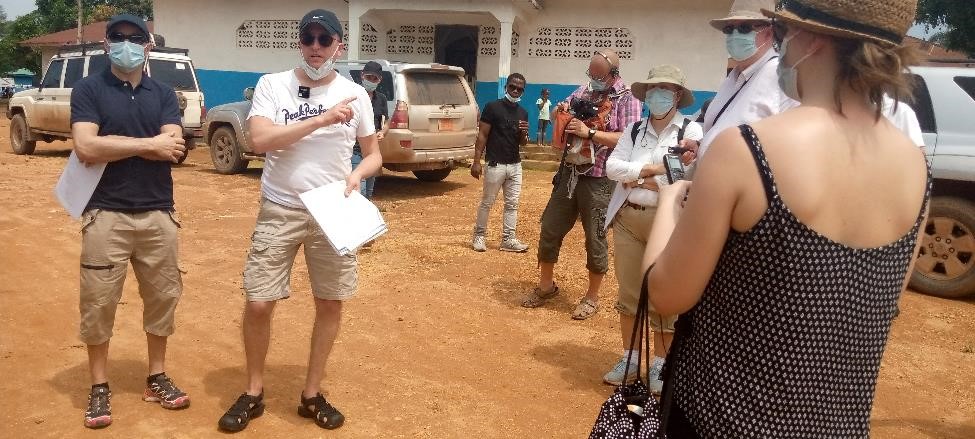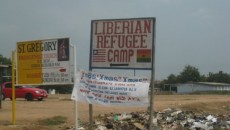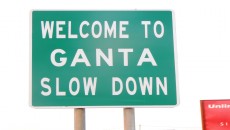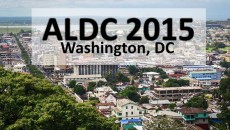VOINJAMA, Lofa – Villagers in Lofa last week became the first Liberians to host a court prosecuting war crimes that allegedly happened in their communities.
The judges, prosecutors, and defense lawyers in the ongoing trial of Sierra Leonean Gibril Massaquoi in Finland came to see the scenes where prosecutors allege Massaquoi committed and oversaw shocking acts of brutality as a commander of the Revolutionary United Front.
The RUF was the breakaway Sierra Leonean rebel group that worked closely with the forces of former president Charles Taylor. Taylor was convicted of war crimes for his role in supporting the RUF in Sierra Leone.
The trial began in Finland on February 1 and ran for two weeks there before moving to Liberia. Presiding Judge Juhani Paiho decided it was easier for the relatively small number of officials from the court to come to Liberia than for the 80+ witnesses to travel from Liberia to Finland in the midst of a pandemic. The trial will continue in a secret location in Monrovia over the coming weeks.
In Lofa, lead prosecutor Tom Laitinen told the small group of journalists traveling with the court that visiting the scenes of alleged crimes, uncommon in other jurisdictions, is considered critical to understanding the case in the Finnish criminal justice system.
“The purpose of the site seeing tour is to show the court places things happened, especially the things that we have included in our indictment,” Laitinen said. “It is important to realize that this is all a Finnish Court which is we’re doing things according to the Finnish legislation and our own legal tradition.”
“It is important that the judges, defense lawyer, and prosecution traveled together, giving them all the opportunity to see and hear the same things,” said Laitinen. “We do not discuss the case when we are here. We come from a system where cooperation is the key to many things and so by cooperating and by understanding and by respecting our different professions, we all come together to perform the trial – that is the only key to make this possible.”
Massaquoi, 51, a Sierra Leonean National and former spokesperson and commander of the RUF, is the first Sierra Leonean to face trial for war crimes allegedly committed in Liberia. Massaquoi, who worked closely with Taylor, is charged with war crimes and crimes against humanity, including murder and aggravated rape, allegedly committed during the Second Liberian Civil War 1999–2003.
One of the spots the group visited is a scene where it is alleged that about eight women were allegedly violently raped by the Massaquoi-led RUF rebels and murdered afterward on his instructions. The Finnish team also saw another scene where 10 children were allegedly locked in a kitchen facility and burned alive.

It is alleged that about eight women were violently raped by the Massaquoi-led RUF rebels and murdered afterward on his instructions on this spot. Photo: Eric Opa Doue.
A palava hut has been built on the spot in memory of those who were massacred. This hut is being used as a market hall for women in the town. In one of the villages, it is alleged that a man was butchered by Massaquoi’s men and pieces of the man’s flesh were placed in a wheelbarrow for sale in the village. He and his men are alleged to have cannibalized some of his victims after murdering them.

Palava Hut built in the memory of those allegedly massacred by Massaquoi and his men in this village. Photo: Eric Opa Doue.
The judge requested that media entities conceal the identity of the towns and villages where the acts allegedly occurred because of the credible threat that witnesses could be targeted for retaliation or intimidation.
Massaquoi is being prosecuted by a Finnish court in the city of Tampere under the principle of “universal jurisdiction,” which holds that crimes against humanity can be prosecuted anywhere and not just in the country in which they were alleged to have happened.
Laitinen stressed that the court process is an initiative of the Finnish government and not the Liberian government. He said the Liberian government permitted the Finnish team to conduct this investigation “and the subsequent trial sessions that will take place over coming weeks as part of bilateral agreements between Liberia and the European Union.”
Massaquoi was arrested in Finland in March 2020 following months of investigation by Finland’s National Bureau of Investigation. The charges against Massaquoi cover a period between January 7, 1999 and March 10, 2003 and were brought after victim advocates Civitas Maxima of Switzerland, working with the Global Justice Research Project in Liberia, alerted them to Massaquoi’s alleged crimes.
Massaquoi and his family were granted residency in Finland in 2008 as part of his deal with the Special Court for Sierra Leone. Massaquoi was a key witness in the prosecution of Taylor and other RUF leaders in the Sierra Leone war. He was given immunity for his crimes in Sierra Leone but not for those in Liberia.
Trials of Liberians who committed war crimes in Liberia have taken place in Philadelphia and Switzerland but this is the first court to come to Liberia. Indeed, the trial will be the only trial of anyone accused of war crimes during Liberia’s civil war to take place on Liberian soil. Justice activists hope the case will breathe new life into the push for a war crimes court in Liberia. A bill for a court is still lingering in the legislature.
About 80 witnesses are expected to testify in court during the hearing in Liberia. The court, which comprises three judges, a state prosecutor, a district prosecutor, a defense lawyer, and the court technical staff will then travel to Sierra Leone. Because of concerns about his security in Liberia, Gibril Massaquoi will remain in Finland. He will be accompanied by one of his defense lawyers and participate in the hearings via a video link.
This story was a collaboration with New Narratives as part of the West Africa Justice Reporting Project
Featured photo by Eric Opa Doue



